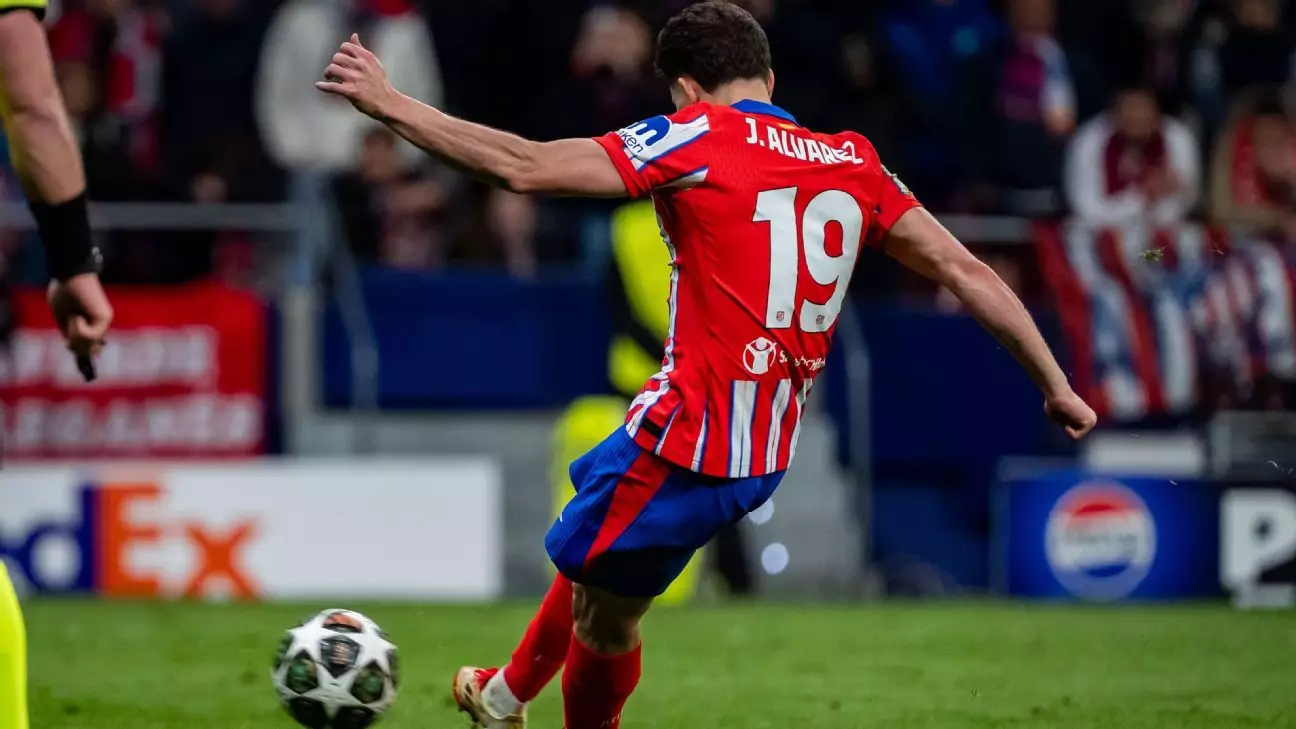The atmosphere was electric and tension palpable in the recent UEFA Champions League round-of-16 clash between Atlético Madrid and Real Madrid. This fixture not only carried the weight of a fierce rivalry but also the pressure of progressing in one of football’s most prestigious tournaments. With the match tied 2-2 on aggregate after Atlético secured a 1-0 victory in regulation time, it was set to be decided by penalties. Yet, what ensued in the penalty shootout was not just a test of skill and composure—rather, it morphed into a controversial debate surrounding VAR decisions and interpretations that would overshadow the players’ performances.
The VAR Dilemma
At the heart of the controversy was a key moment involving Julián Álvarez’s penalty attempt. After slipping during his run-up, VAR officials determined that the forward had made contact with the ball twice—an infraction that led to the penalty being disallowed. Diego Simeone, Atlético’s staunch and intense manager, was vocal about his discontent, questioning the rationale behind the decision. He adamantly stated, “The ball doesn’t move,” suggesting that Álvarez’s touch hadn’t disrupted the flow of play enough to warrant such a ruling. This raises an essential argument: where do we draw the line between strict adherence to the rules and the spirit of the game? The VAR should assist in making football fairer, yet it can sometimes feel like a barrier to the raw emotions and uncertainties that make sport exhilarating.
Player Perspectives
Simeone’s frustration was echoed by both players and pundits alike. The sentiment in the locker room seemed to hinge less on bitterness and more on a sense of unjust misfortune. Real Madrid’s goalkeeper, Thibaut Courtois, acknowledged the tricky nature of the circumstance by admitting it wasn’t straightforward to detect. However, he also noted the overused narrative of victimhood that often emerges from Atlético’s camp, punctuating his comments with an exasperated, “I’m sick of this victimhood.” This remark reflects a complex layer in football culture where narratives can sometimes distract from the actual events on the pitch.
On the flip side, Real’s coach Carlo Ancelotti highlighted the harsh reality that penalties are akin to a lottery—sometimes luck is merely the deciding factor. Ancelotti’s tactical decision-making in allowing Antonio Rüdiger to take the decisive penalty instead of young talent Endrick points to pre-existing strategies woven with real-time decision-making. Ultimately, the chaotic nature of football necessitates a balance between calculated tactics and pure instinct.
Emotional Resonance
Despite the defeat, Simeone’s pride for his players shone through. He firmly stated that his team exhibited exemplary competitiveness. Isn’t this a reflection of what football is all about? The thrill of contest, the camaraderie among teammates, and the battle against adversity—these experiences often transcend the mere outcome of any single match. However, the disallowed penalty instilled a palpable bitterness. As much as one wants to remain objective, such moments provoke impassioned responses from players, coaches, and fans alike, showcasing just how high the stakes truly are in modern football.
The Aftermath: Looking Ahead
With Real Madrid now advancing to face Arsenal in the quarterfinals, this moment serves as a testament to the unpredictability and often contentious nature of knockout football. For Atlético Madrid, it symbolizes another chapter in their ongoing rivalry and the challenges they continuously face in the pursuit of greatness.
Closing the door on this controversial shootout won’t be simple. Fans, players, and analysts alike will continue to dissect both the events leading up to the penalty miss and the wider implications for VAR in football. As the debate rages on, one undeniable truth remains: the heart of the game lies in its complexity, eliciting profound passion, intense rivalries, and unforgettable moments—even those marred by controversy.


Leave a Reply